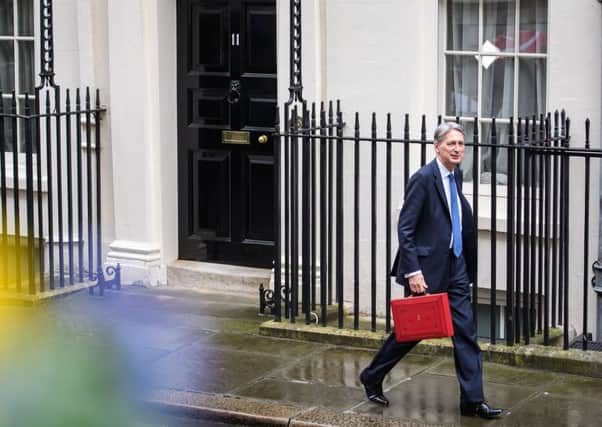Budget: Philip Hammond makes tax raid on self-employed


National Insurance for self-employed people will be brought closer into line with charges for employees, with tens of thousands of Scottish taxpayers being hit with an average £240 per year increase in their charges by 2019.
Across the UK, up to 2.5 million people will be affected, with opposition parties accusing the government of a “scandalous attack on aspiration” that would see “white van man” being “clobbered” by the taxman.
Advertisement
Hide AdAdvertisement
Hide AdIndependent economic forecasts on the eve of Brexit negotiations getting under way confirmed strong growth over the next five years, with the national debt set to peak next year at 88.8 per cent of GDP.
As he stored up a war chest for expected choppy waters ahead as the UK goes through the process of the EU, the Chancellor told MPs there was “no room for complacency”.
In his slimmed-down 64-page Budget, he said there will be no increase in long-term borrowing and all new spending will be paid for by a crackdown on tax avoidance and increasing National Insurance, which will raise £2 billion by 2022.
Small business owners and investors with shareholdings outside Isas and pensions have also been hit, with the government cutting the tax-free dividend threshold from £5,000 to £2,000, raising another £2.6bn for the Treasury over five years.
Much of the revenue will be spent on social care and grammar school places in England, with the Scottish Government getting an additional £350m through the Barnett formula.
Lucy-Rose Walker, chief executive of the start-up incubator Entrepreneurial Spark, which was founded in Glasgow, warned the measure would lead to fewer entrepreneurs taking the risk of starting their own business.
“Increasing National Insurance rates for the self-employed could be a further step by the government to penalise those who are taking risks and starting a business, often giving up their regular pay cheques to take a chance at creating something great,” Ms Walker said.
“Removing the few remaining incentives of being self-employed is counter-intuitive and will lead to fewer enterprises and consequently fewer jobs.”
Advertisement
Hide AdAdvertisement
Hide AdThe changes come despite a pledge in the 2015 Conservative manifesto, which promised the party would “not increase the rates of VAT, income tax or National Insurance in the next parliament”.
Treasury sources said the government had honoured the commitment by not raising National Insurance for those working for an employer.
Class 4 National Insurance will rise from 9 per cent to 11 per cent over two years, compared to the 12 per cent paid by employees in Class 1. The changes will begin to take effect in April 2018, and will be partly offset by the previously-announced abolition of Class 2 National Insurance.
Mr Hammond said the £5bn cost to the Treasury from lower National Insurance for the self-employed was “not fair to the 85 per cent of workers who are employees”.
The Treasury insisted the policy would target high-earners, such as partners in law firms, with the average loss estimated at 60p a week and those earning less than £16,250 a year seeing a fall in their bills.
The Chancellor announced a review to examine how the government could help fund parental leave so self-employed workers could take time off to start a family.
SNP economy spokesman Stewart Hosie MP said the Chancellor had been forced to raise taxes for the self-employed because of cuts to corporation tax, which will fall to 17 per cent by 2020, the lowest in the G20, from 20 per cent now.
“In order to make amends today or to make the numbers stack up we have seen a scandalous attack on aspiration, on the self-employed, taxing them more,” Mr Hosie said.
Advertisement
Hide AdAdvertisement
Hide Ad“The party of aspiration taxing those who are self-employed putting in active, real, hard disincentives to starting businesses, to employing people, to stepping out on one’s own. I think that is a decision which will come back to haunt this Chancellor.”
Scottish Labour Westminster spokesman Ian Murray said: “This is yet another broken manifesto promise from the Tories. This Budget proves once and for all that ordinary working people just cannot trust the Tories.”